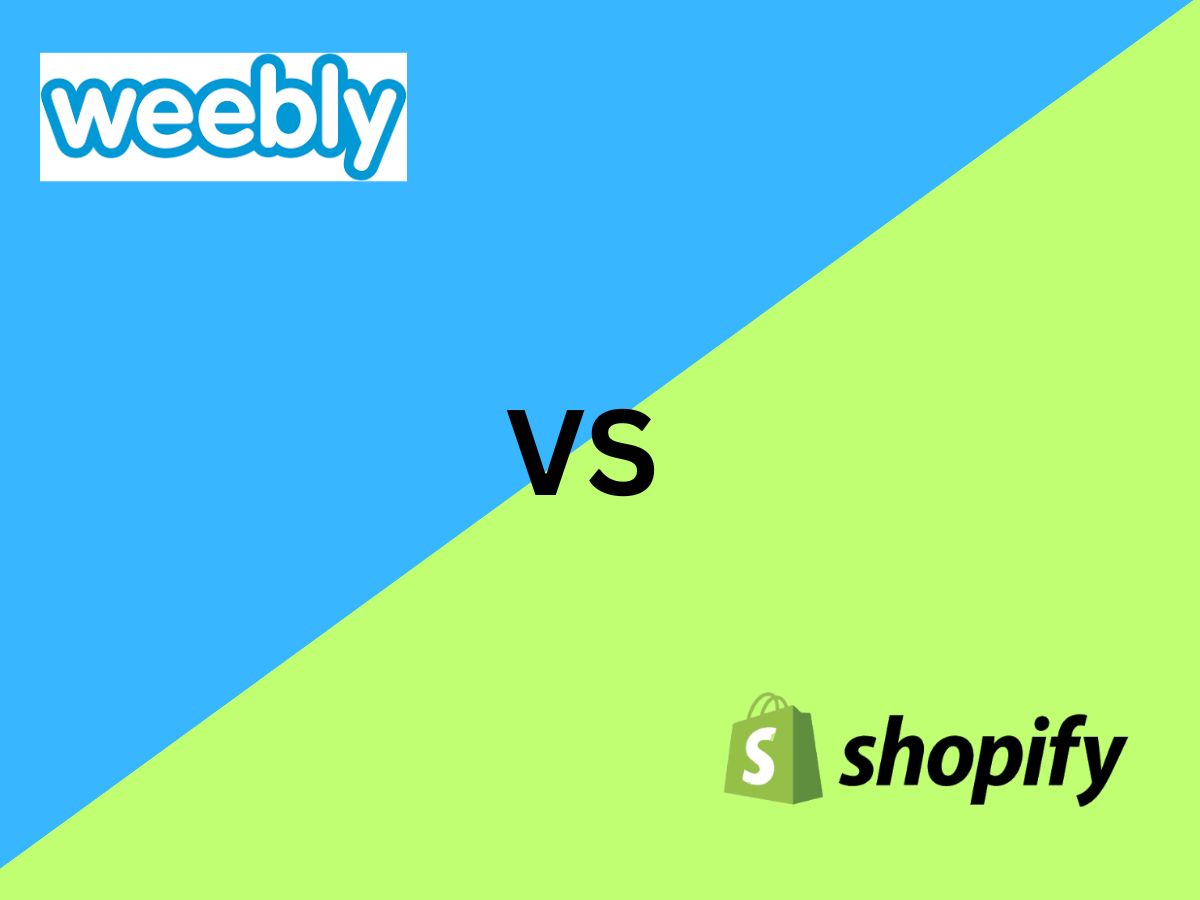Selecting the right platform is very important for businesses to succeed in e-commerce. Weebly vs Shopify are the main companies in this area. Every accounting system supports various business requirements, giving unique features, charges, and help options. The guide looks into the main features of both platforms to guide your decision-making.
Quick Verdict: Weebly vs Shopify
Beginners and small enterprises find Weebly useful because it is simple to use and helps them cheaply build a basic e-commerce website. Square integration and the simple drag-and-drop builder mean it’s suited to starting a store or business online. Businesses with growth plans and a strong web presence should use Shopify. It supplies advanced e-commerce features, stronger scalability, and access to an extensive app community. For a platform that helps with long-term growth, Shopify is the top choice. If you want things to be easy and inexpensive, Weebly is a good place to set up your site.
Pros and Cons of Weebly
Pros of Weebly
- Interfaces Designed for Beginners: The drag-and-drop builder helps new users make and control their websites.
- Ability to Pay Less, With Prices That Suit Your Budget, and a Free Option to Use Without Paying.
- Square Payment: Processes credit card or mobile payments easily, in person or online.
- Easy to Start: Easy setup and short time to get started.
- Basic E-commerce Tools work well for both small and mid-sized shops.
Cons of Weebly
- Hard to scale up: Not suitable for companies experiencing major or rapid growth.
- There are not many ways to change how Squarespace looks.
- A limited number of outside add-ons and tools are available on the App Marketplace.
- E-commerce stuff isn’t as advanced; there’s no chance to offer multi-currency transactions or extensive inventory management.
- Limits to Support: They do not offer 24-hour support; with the higher plans, you can only access live help.
Pros and Cons of Shopify
Pros of Shopify
- E-commerce Tools: Special features designed for online businesses include recovering items left in carts, selling on several channels, and additional tools.
- Suitable for businesses ranging from small startups to big enterprises since it is very scalable.
- A massive App Store provides over 8,000 tools for customization, automation, and marketing.
- For professionals, these bootstrap themes offer modernity, responsiveness, and ways to improve conversions.
- There is customer support available all day, every day using live chat, calling, or sending emails.
Cons of Shopify
- Pricier Plans: You pay more for payment plans and additional transaction charges (if not using Shopify Payments).
- Difficult for Beginners: As there are more features, beginners often find it harder to use.
- It’s possible that more advanced theme editing, such as major changes, requires knowing HTML, CSS, or Liquid.
- Requiring Additional Apps: To enjoy many features, you usually have to install (and pay for) extra apps.
Weebly vs Shopify: Pricing & Service Plans
Weebly Pricing and Plans
A selection of Weebly plans is effective for startups and small businesses.
● This plan is suited to personal use or to explore the platform.
● Personal Plan: For $6 a month, it is good for ordinary websites.
● A Professional Plan costs $12 per month and has additional helpful features.
For $26/month, this tier gives you better services for online sales.
Prices are charged in one lump sum every year.
Shopify Pricing and Plans
Shopify gives different price options to suit companies, no matter their size.
●Basic Plan: $39 a month, and is meant for starting up a business.
● Shopify Plan: $105/month, which includes extra functions.
● Advanced Plan: $399/month, for companies looking to grow.
Shopify Plus offers customized prices to companies with big requirements.
You must pay transaction fees if you choose a payment provider other than Shopify Payments.
Ease of Use
It’s especially simple and straightforward to use Weebly, making it user-friendly for those just starting. Using a true drag-and-drop builder, users can simply put text, images, and videos in any position on the page without knowing how to code. Since the dashboard is basic and intuitive, people can easily handle and operate their websites without many lessons. For this reason, Weebly is a good solution for individuals and small companies wanting to set up an online site easily.
Because Shopify includes so many e-commerce features, it is a little more complicated than before. Because Shopify was created just for online stores, it offers a lot of functions and settings that might appear confusing at the beginning. Even so, the backend is easy to grasp, there are abundant instructions, and help from support is always available. Users are supported through the setup, where they add their products, set up payment, and configure shipping.
All in all, Weebly is the clear pick for people only starting with small websites or online stores, but Shopify offers more features and advanced options for those ready to expand.
Weebly vs Shopify: Themes & Layout Options
Designing and customizing on Weebly is simple and designed for those new to website building. It contains more than 60 themes that are responsive, current, and fit different kinds of web pages. You can customize how pages appear just by dragging and dropping elements, without coding them. Anyone can change things like text, images, and video,s and those who know HTML and CSS can change the website’s code to create custom designs. But because there are not many customization choices, Weebly is more convenient for users who want things to be basic.
Conversely, Shopify is great for customized design on sites dedicated to e-commerce. It has over 110 beautifully made themes, many built for use on mobile devices and sales. While themes are available for free, you have to purchase many premium ones. Shopify offers a theme editor to make adjustments, and people comfortable with Liquid, HTML, and CSS can fully customize their store in detail. The site builder comes with the ability to use third-party themes and page builder apps as well.
All in all, Weebly is the best option for those wanting to design easily, and Shopify is recommended for advanced users who need many options for a strong and flexible store.
Weebly vs Shopify: E-commerce Features
While looking at e-commerce features, you can tell that Weebly and Shopify are quite different in what they can do. Running an online store smaller than medium in size? Weebly, which relies on Square, has everything you need. Features you’ll need are product listings, handling inventory, generating coupons, calculating shipping, setting tax rates, and using Square as a payment system. Weebly lets users sell digital products, manage their customers, and have taxes computed for them. It does not offer many features for complex inventory management, working across various sales channels, or engaging in exports.
Shopify stands out as a complete e-commerce platform created for companies of all sizes. The system helps with unlimited products, managing inventory, recovering abandoned carts, selling in various currencies, and offering many payment gateways. You can find powerful tools on Shopify for dropshipping, using a POS with your store, customer management, order fulfillment, and finding real-time shipping rates. Users can use apps to set up loyalty programs and automate email marketing.
All in all, Weebly will work for small operations that just want basic e-commerce, especially if using Square. Growing businesses will prefer Shopify because it offers powerful and flexible online retail tools.
Apps & Integrations
Shopify offers far more apps and different kinds of integrations than Weebly does. Over 8,000 apps are available in Shopify’s App Store, which users can use to add tools for things such as marketing, SEO, dropshipping, accounting, customer support, and so on. You can find apps that are free or cost money, and most are made by companies apart from the main telecom provider. Shopify supports easy connections with Facebook, Instagram, Amazon, and Google Shopping, which simplifies conducting business across several channels. A strong group of developers guarantees improvements and support in every stage of a business’s growth.
The Weebly App Center contains about 370 apps, though it covers fewer features than the App Store. The essential areas they handle are marketing, online sales, social media, and site development. Square integration lets businesses handle their sales and payments smoothly, as they already use Square’s tools. While one can still get some third-party help, the selection of shop tools on Ecwid is narrower than on Shopify.
All in all, Shopify gives businesses more flexible ways to work with different applications and services. Weebly provides what a user needs and fits well for those looking for basic features without paying for complex tools.
Security
Security is the main aspect that requires attention, while support is only a minor way.
Security and customer support matter a lot in operating an online store, and both platforms offer trustworthy solutions for these, though they differ in how much they cover.
All Weebly websites get free SSL certificates that guarantee encrypted communications during checkout and secure browsing. Being integrated with Square, the store’s payment security is governed by the solid and PCI-certified system Square provides. Emails, live chats, and phone calls are all accepted for help, though the phone service usually comes with upgraded packages. A help section is available, stocked with guides, tutorials, and open community forums. But Shopify can offer more continuous help compared to this platform, where support may be hard to get sometimes.
On the other hand, Shopify gives the most attention to security for larger businesses. SSL certificates and PCI DSS compliance at the highest level guarantee safe payments and your privacy. Because Shopify has live chat, email, and phone support available at any time, merchants can ask questions or get help quickly. The website offers a broad knowledge base, forum,s and a large group of support users.
Therefore, Weebly supports small business safety and easy customer care, whereas Shopify ensures more advanced protection and continuous customer support that fits stores boosting sales and visits.
Scalability
The ability to grow is a main requirement when selecting an e-commerce platform for rising companies. Weebly, which runs on Square, is designed for small to mid-sized businesses or entrepreneurs who need an easy and economical website builder. Online stores get basic selling tools such as ways to keep track of stock, arrange for shipping, and customize products. As time goes on and your business needs do the same, meaning better marketing automation, more selling on different platforms, or improved inventory control, Weebly might not be enough. Because of limited apps and integration, Salesforce may not keep up with businesses that need more features over time.
Things are different with Shopify: its design makes it easy to grow. Shopify’s platform grows along with your business, whether you are a startup or an established company. It can handle a wide variety of products, large amounts of traffic, in-depth reporting, as well as connecting to marketplaces, social sites, and POS software. The huge selection of apps from Shopify permits businesses to add new features whenever needed, and Shopify Plus and other top plans give companies enterprise tools and the chance to personalize processes.
Weebly is good for those who want a basic site or are running a small business, and Shopify helps bigger businesses scale up and have everything they need to grow while staying on Shopify.
Final Verdict: Weebly vs Shopify.
Weebly is a good option for people starting out or those running small companies, as it is simple, affordable, and features all the basics for e-commerce. Businesses with simple websites and low online demand, such as local shops, find this service ideal because of its simplicity and Square compatibility. But, for companies looking to expand and handle sales on many platforms, Shopify is the top choice. Because of its wide range of powerful features, customization options, and helpful support, Shopify is designed for medium to large businesses that are looking to expand. Given that, Weebly is good for those looking for an easy and low-cost site, and Shopify is best if you want to grow and have advanced e-commerce needs.









